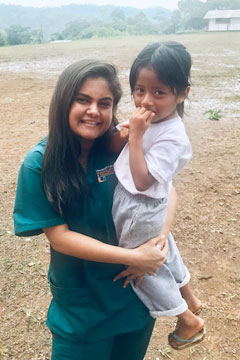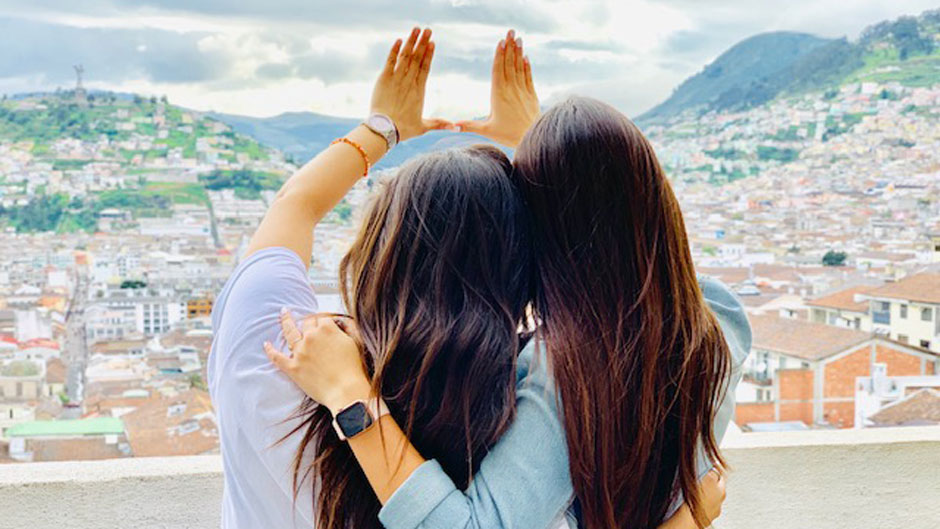Each spring break, the University of Miami chapter of MEDLIFE participates in week-long trips to two different locations where students volunteer and shadow doctors who operate in low-income areas. This year’s locations were Cusco, Peru, and Tena, Ecuador, where sophomore Aloki Patel spent the week. MEDLIFE is a nonprofit with student chapters on many college campuses and stands for Medicine, Education and Development for Low Income Families Everywhere.
Patel described some of her experiences in Tena, about a four-hour drive southeast of the capital of Quito. She went on the trip with 12 other UM students.
We arrived in Tena late Saturday night, and spent Sunday sightseeing, grocery shopping, and getting acclimated to the altitude. Tena is a beautiful city situated in the middle of a mountainous rainforest with waterfalls and rivers cutting through roads. We took advantage of the natural beauty by hiking through the Jumandi Caves and white water rafting on a tributary of the Amazon River.
The next morning, our true mission began. We spent most of the week aboard a mobile clinic, where we were volunteering in villages and rural areas about an hour from the city of Tena. We consulted patients with various conditions and identified those that needed urgent medical consultations in Tena. One patient was a woman about 70 years old, who walked into our clinic suffering from a severe stage of Parkinson’s disease. She was nearly immobile. After examining her, a MEDLIFE doctor found a lump in her lower abdomen. One of the MEDLIFE nurses then took the patient to a Tena hospital to conduct necessary testing, and she was diagnosed with cervical cancer. MEDLIFE would now be able to follow up with the patient to get treatments for her cancer and arrange transportation to and from downtown Tena.
Another patient was a 7-year-old boy who had broken both his arms while playing at school. He had been in unbearable pain for weeks, with low mobility because no one had diagnosed him properly or set him in casts. MEDLIFE was now able to follow up with the boy to make sure he got the arm casts. Otherwise, the child would have lived his life with intolerable pain and low hand mobility, simply due to lack of access to nearby health care.
 Despite these cases, the majority of the patients that we consulted in the mobile clinic had parasitic illnesses. This was not unusual because people in this area live in tropical rainforest terrain with unpurified water resources and inadequate health care systems. Yet, the treatment of parasites for kids is one tablet of Albendazole for a day, and for adults it is two tablets of Tinidazole every 8 hours for three days. That’s all they needed — just a couple of tablets to live a normal, healthy life. Unfortunately, instead of that, many of these people live in constant pain with a low appetite, which negatively affects their physical function.
Despite these cases, the majority of the patients that we consulted in the mobile clinic had parasitic illnesses. This was not unusual because people in this area live in tropical rainforest terrain with unpurified water resources and inadequate health care systems. Yet, the treatment of parasites for kids is one tablet of Albendazole for a day, and for adults it is two tablets of Tinidazole every 8 hours for three days. That’s all they needed — just a couple of tablets to live a normal, healthy life. Unfortunately, instead of that, many of these people live in constant pain with a low appetite, which negatively affects their physical function.
On our very last day, known as project day, we helped build and renovate the house of a family. We replaced plastic tarps with wood to protect them from frequent rainfalls and to prevent mosquitoes and bugs from entering their living space. We also provided them with bed frames and mattresses, so the family no longer had to sleep on leaky wood floors.
This trip gave me a new perspective on the world and helped me to appreciate the little things. Little things that I have, but until this experience, did not recognize their importance, such as clean water to drink, nutritious food on my plate, immediate access to a health care system, as well as first aid supplies and basic pain medications. It’s astonishing that a cast can help a little boy play volleyball with his friends again, how a few tablets of Tinidazole can help cure a mother with parasites in her stomach, or even how a simple Band-Aid can help prevent a cut from becoming an infectious wound. These are the things we take for granted in the United States, but they are life-changing resources for impoverished families in remote areas.
This experience solidified my intention to become a doctor one day and to help break down the widespread inequalities present in the health care system.

